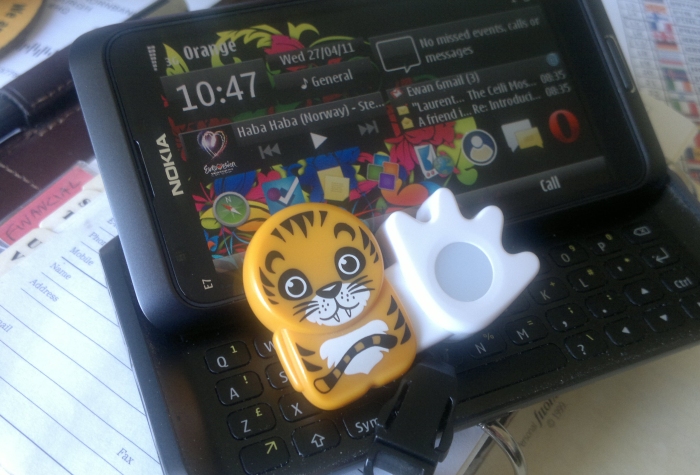
I have a Poken, had one for about two years. The company continues to expand, adding more services and products to their range. In essence they are small, personal NFC-chipped key-rings or USB mass storage devices. These chips each have a unique identifier, and when you pop them into the USB socket of a computer you are logged onto the main Poken website as yourself. If you’ve encountered any other Poken on your travels and “touched” them together in an NFC enabled handshake, then these are uploaded to the website, and the full contact details, social networks, websites and other information is shared, much like a business card exchange, but with a lot more depth.
The only problem is that in all my time with a Poken Spark, I’ve never met up in the real world with another Poken user. The NFC technology, the smart website to capture social networks and share connections, I’ve been able to use none of that. Perhaps I’m just on the fringes of the target market, or I’m not being invited to the right conferences in America, but the result is the same. A great idea, but ultimately yet another piece of tech that I’ve paid for that sits there looking like a toy tiger, but not actually doing anything.
Which is why Poken on Nokia is so exciting.
As many people have noted, Nokia are really good at shifting a lot of phones – phones that are packed with bits of hardware and an operating system that lets people develop applications to use all that interesting tech. By placing what is still a really neat idea (touch together two physical avatars to exchange all your contact details) inside hardware that is pretty much standard over a range of millions of handsets... I think anyone could see why that would attractive to a start-up.
This isn’t limited to Nokia and Symbian, by the way. It’s one of the inherent advantages of generic and programmable hardware. Look at the success of Bump – a contact and file exchange system that went multi-platform and certainly does show up on the tech conference circuit. Would they have the same impact if everyone had to pay $10 and carry around a second piece of hardware? It’s unlikely.
The smartphone platform can deliver the building blocks needed. If you’re in the business of getting your idea to as many people as possible, then you need to be addressing generic hardware. And while Symbian might have been given an “end of life” date, effectively during 2012 for new devices, so into 2013 for handset usage, it still has a huge numerical strength and flexible choices for developers - and good NFC support.
So to see Poken make the jump to Symbian, and using Qt as well, is a welcome move. A lot can change over two years, as any start-up will tell you, but with the existing infrastructure around Symbian, will we see more smart ideas coming to the platform?
-- Ewan Spence, April 2011.
